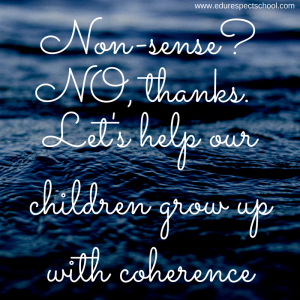Being an example for your kids is the best instrument that you have for them to build in learnings. All kind of learnings: food and hygiene habits, social skills, respect, security, etc.
There’s no magic wand for this (for nothing at all, in fact). But the truth is that using our example and being the ones who guide them through our lifestyle, they will understand and get the value of what’s right or wrong, what’s necessary or not, what’s important or not, and so on.
As an example, the best way to achieve that your children eat, value and even enjoy vegetables is, in fact, that you eat them. It would be great if you bought assorted vegetables frequently, if your children could participate in choosing them, if they helped to cook, if they tried different textures, etc. But all this is a plus: if you don’t eat, the battle is virtually lost.
Today, I’m going to talk about nine nonsense habits that you should break as a parent. Nine things that we often demand our children, when, in fact, we adults are unable to accomplish.
1- To cross the street with a “DON’T WALK” signal ON. Apart from incoherent, it is terrible for our kids and their road-safety education. When we walk alone, it’s something that we do quite often. Red light, we are in a hurry, we check that nobody comes and… Bang! We cross the street! But the fact is that we start acting the same way also when we walk with children by the hand. They ask us surprised: “But, Daddy, why don’t we wait until it turns green?”. And the father just answers poker-faced: “We are in a rush.” Like if this or other obligations were enough excuse to put lives at risk. And not only your children’s lives are at stake, because in case you walk alone it may result that some children on the street happen to see you breaking a rule. So, please, every time you see a red light or “don’t walk” on, take a breath, be patient and wait. That’s the only way you will show the ones you love how they have to move on the street with caution.
2- To yell at them and expect they don’t yell back. When you shout to your kids, the consequences are not just at an auditory level, but they can affect their emotional, biological and social areas. You must cross yells out of your personal how-to-educate-children list (educate including respect, empathy, and love, I mean). Many parents require their children not to shout (to siblings, at school, at a restaurant) but they constantly talk yelling at them. It is incoherent and almost a sci-fi issue to demand something you are not able to accomplish. I know that stressful lives and day-to-day routines can add difficulty to your goals, but believe me: you can do it. Not only you CAN do it; you MUST do it.
3- To swear. It depends on cultures, but it is quite common in western societies to use curse words to express one’s emotions or discomfort. These words are stuck to our language, and we sometimes use them in front of our kids. Of course, if you want your children not to swear, you must stop using them. You should start “refining” your language, replacing words, and taking care of this aspect of communication, for them to build in the pattern. However, some families don’t mind their children use swearing words; this is just a matter of individuals’ choice. What we cannot do is something like: “Fuck! Could you stop swearing, please?”
4- Not to say “I’m sorry.” Everybody feels comfort when receives an apology after being hurt. And that’s because forgiveness is necessary when communicating with other people. Then, why do we never say sorry to our children? Some parents always demand their children to apologize with others: to a little friend in the park after stealing a ball, to granny after leaving home without having kissed her, etc. However, many of those parents find it difficult to say sorry to their kids when they make mistakes. To apologize is important, so… DO IT!
5- Using your smartphone all the time. We set time limits for children in almost everything: to get up, to have breakfast, to go to school, to go to after-school activities, to play, to have dinner, to watch TV, to use the tablet… It seems that a children’s life must be totally disciplined and stipulated (although we all know how oppressive this can be). All this may cause many conflicts at home, and parents just don’t have any clue on how to manage it correctly. And they could learn how to handle them as simply as to come OFF their devices: they speak to the kids looking at the phone, cook dinner while answering some messages, go to the bathroom and update Facebook, have dinner with family while reading an online newspaper, etc. Can anybody think this is the best way to teach our children a concerned use of technologies? Living this digital age is positive actually, you should not deprive your kids of using devices, but if you want them not to get obsessed, then start scheduling your own usage of your phone. Just switch it OFF when you are with your kids.
6- Want them to share, but you do not share yourself. Would you really like to give (although temporarily) your precious latest generation smartphone to a stranger? Have you ever lent your wallet to a person you barely know? It’s the same with kids! Why do we oblige them to lend their things all the time? We tend to think that sharing is important, but the key points are respect towards other people, empathy, and responsibility. This is not about sharing everything we have with everybody, but to develop understanding. So, to get this, we’ll have to be the first ones to work on it and put it into practice. And to understand that they should not be obliged to share all their belongings. Children need our respect so they can learn how to respect others.
7- Spanking your child because he/she had hit before. To beat a child is, in any manner or situation, incoherent, mean, disrespectful, horrible and offensive. You should never EVER hit your kids. Do NOT use your strength or physical advantage upon them. Families often use physical violence to manage conflicts and fights between siblings or friends, and as a result, children enter a closed loop from which they cannot escape. For example, you are in the park and your child starts a fight with other kid cause they both want the same toy and they end up hitting each other. Then you get there and spank your little one. The message that he/she will learn is “Ok, you are doing what you are telling me not to do.” You are just ignoring the respect that you are demanding him/her, so don’t expect they are going to assimilate the learning. Change your beliefs, STOP SPANKING your children.
8- To walk barefoot at home and want children to wear slippers. To go barefooted is far from bad, quite the opposite: many pieces of research have been made about the benefits for both body and mind. However, many parents establish the rule that their children cannot walk without any shoes at home (I think that these parents will have, at least, a well-founded reason). What’s not valid at all is to demand children to wear slippers and walk barefoot ourselves. If we want to establish this rule, it’s ok, but hey, do not harp on and on about it every time they reject. Always remember that you must walk the talk (if you allow me the redundancy).
9- To lie. Using lies to bring children to one’s point just shows a lack of positive and efficient communication skills. For example: “Come on, guys, we must leave the park, it’s going to start raining” (and splendid sun brights high). Or your mobile phone rings and you say: “Sweetie, could you, please, answer and tell granddad I’ve forgotten cell at home?”, etc. The message you are giving them is quite simple: lying is valid to achieve what you want, no matter the damage you are making to others, nor their feelings. Then parents get surprised when their kids start lying, and they tell off, punish, get angry, feel disappointed, etc. Quite unfair, don’t you think? You teach me but, then, you scold me. Let’s all learn a better communication to throw lies out of human relationships.
To educate with respect and understanding is not difficult. Maybe what’s harder is to fight back your adult interests and day-to-day stress.
If you put this advice into practice and you stop acting incoherently, the relationship with your children is going to improve (I’ve no doubt at all). What’s more important, you will be watering the seeds for them to develop responsibility, freedom, happiness, security, respect and coherence by themselves.
May I ask you something? If you found my words useful, please share with others (a good way to begin acting coherently) 😉
Thanks for reading,
Parent & Teacher Educator, Author, Expert in Respectful Education & Founder of Edurespect School


